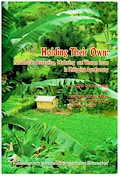| Book Chapter |
 |
|
| Title | Women Farmers and "Angels of the Earth": Piloting Vermicomposting in a Vegetable-AF System | | Author | Ma. Elena Chiong-Javier, Caroline Duque-Piñon, Agustin Mercado, Jr. and Manuel Reyes | | Editors | Ma. Elena Chiong-Javier, Caroline Duque-Piñon, Agustin Mercado, Jr. and Manuel Reyes | | Year | 2012 | | Book Title | Holding their own: Smallholder production, marketing and women issues in Philippine agroforestry | | Publisher | Social Development Research Center, De La Salle University | | City of Publication | Manila, Philippines | | Number of Pages of the book | 21 | | Pages | 101-122 | | Call Number | BC0330-12 | | Keywords | Women farmers, vermicornposting. sustainable technology. organic fertilizer |
|
| Abstract: |
| Earthworms are known as "angels of the earth" in ancient China. In the last 40 years, the value of these earthworms to farming has been introduced in the Philippines through vermicomposting, a technology that uses them to convert biodegradable wastes into high quality compost to be applied to plants as organic fertilizer. The potentials of vermicomposting for managing solid wastes, improving soil fertility and safeguarding human health have been investigated. But how gender-responsive is this technology for women farmers in an integrated vegetable-agroforestry (VAF) system? Responding to the need of women farmers for cost-saving fertilizer inputs, a pilot vermicomposting project using African nightcrawler species (Eudrilus eugeniae) was started with 10 women farmers who produced commercial vegetables and agroforestry crops in an upland barangay of Lantapan, Bukidnon. Although the women received the same material inputs and most went through the same technical training, the results of their trial vermicomposting practices varied. Nevertheless, the following findings stood out. The technology was not only easy for women to adopt, but it had also been able to harness the interest and participation of male spouses and children. Replacing urea and chicken dung with vermicast had generated savings that women could channel to pay for other pressing household needs. Based on some initial sales of worms and cast, it promised to be a lucrative source of additional income that could be sustained on minimal capitalization. Moreover, women's scientific interest was aroused as they experimented on which combination of organic waste materials from VAF farms could yield the greatest worm and cast harvests. The major challenge lies in standardizing the women's vermicomposting practices to attain maximum potential gain for both women and the environment |
|
|
Download file(s): Click icon to download/open file.
|
| |
File Size |
Description |

|
2,089 KB |
Softcopy |
|
|
GRP 2: Maximizing on-farm productivity of trees and agroforestry systems
GRP 6: Developing policies and incentives for multifunctional landscapes with trees that provide environmental services
|
| Viewed in 3214 times. Downloaded in 477 times. |